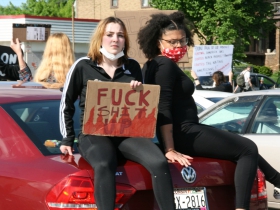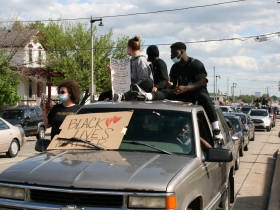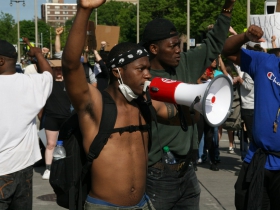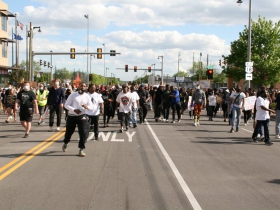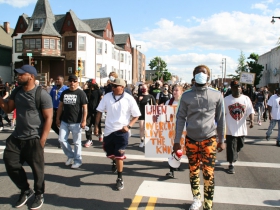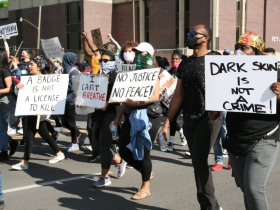People’s Revolution Marks 200 Days of Protest
Protests against police brutality match the record of 1960's open housing marchers.
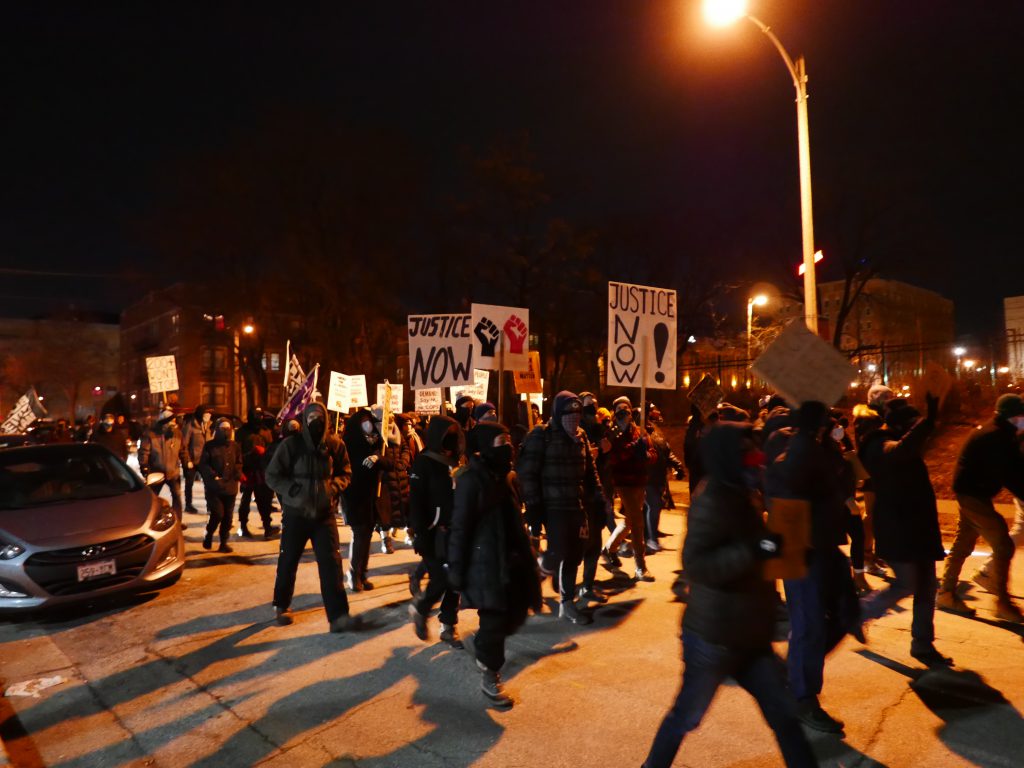
The People’s Revolution 200th day of protest.
A large group gathered Monday night to march and celebrate the 200th consecutive day of action in Milwaukee aimed at protesting police killings in the Milwaukee area and around the country.
The group calling themselves The People’s Revolution met at the intersection of N. 24th Street and W. Michigan Street, outside the Rave Eagles Club.
It was a frigid night for a protest. The temperature was below 30 degrees. Still, somewhere between 50 and 100 people were on hand. They bundled up, sharing hand warmers and passing out hot chocolate. The scene seemed distant, both in time and temperature, from the scorching days of early summer when protesters first took to the streets in marches against the killing of George Floyd by Minneapolis Police Officer Derek Chauvin.
Marchers were in the streets protesting police brutality and it wasn’t long before they met with this themselves, as police at times responded violently, beating protesters, tear gassing them and shooting them with rubber bullets.
On some nights rioting and destruction broke out after peaceful marches had completed. Though this was nearly always followed by an effort the following morning to clean up the neighborhoods where this occurred.
The City of Milwaukee called a curfew. The Wisconsin National Guard was mobilized. But still protesters persisted. Marches would run all day long, twisting and turning for miles through the city, sometimes marching clear out of the city into the suburban North Shore, or west into Wauwatosa.
Some of the summer’s leaders had been activists for years, others were new to marching and organizing. But their names became associated locally with the movement for justice for the victims of police killings and for major reform of American law enforcement. They were people like Khalil Coleman, Destiny Monae, Vaun Mayes, Frank Nitty and Mariah Smith among many others.
The 200 days marker is significant to the protesters because in 1968 activists marched for 200 days in Milwaukee for fair housing and an end to racial discrimination. Shortly after the 200 days of protests, the U.S. Congress passed the Fair Housing Act of 1968.
And so Milwaukee has seen 200 days of marches and protests for the second time in less than a century. However there is no grand legislation this time making its way through Congress, or even the state Legislature, to address policing and police killings. Republican legislators have suggested they may consider some kind of bill on this in 2021.
Protesters celebrated reaching 200 days, but emphasized that the movement was not ending Monday night. “Long live the revolution,” they shouted. And they sang, “The People’s Revolution has been fighting for 200 days, that’s right.”
The People’s Revolution has become the leading group protesting the City of Wauwatosa and the Wauwatosa Police Department over the killings of three black men by Police Officer Joseph Mensah, who recently resigned from the force.
Organizers addressing the crowd Tuesday night said 200 days was a “great milestone” and said “We should be damn proud of what we have accomplished so far.” But they said they will continue to march, because the families of victims of police killings are still waiting for justice.
Jose Acevedo, the father of Joel Acevedo who was choked to death by off-duty Milwaukee Police Officer Michael Mattioli, came to the march. He said his family continues to fight to have the body camera footage released, and to have the two men that helped restrain Acevedo while Mattioli choked him charged as accomplices in the murder.
Taleavia Cole, Alvin Cole’s sister, was at the march Monday. Her brother was one of the three men, including Jay Anderson, Jr. and Antonio Gonzales, who were killed by Mensah.
“200 days is a blessing y’all, it is a blessing and an honor to be here with you all,” she said.
On behalf of the Cole family, Taleavia encouraged the protesters to keep going. “Everything you’re demanding, it aint gonna take one day it aint gonna take one week, it’s gonna take time… as long as you keep agitating, as long as you keep educating and as long as you keep taking the streets, it’s gonna happen y’all,” she said.
“Without struggle there is no progress, there is no progress,” Cole said, adding that protesters should embrace the struggle. “Because guess what, you went through it. You did it.”
And, families like hers, she said, “We need y’all, we need y’all.”
Photos from the Protests
More about the 2020 Racial Justice Protests
- Plea Agreement Reached On Long-Pending Sherman Park Unrest Charges Involving Vaun Mayes - Jeramey Jannene - Oct 17th, 2024
- Rep. Ryan Clancy Settles With City Following 2020 Curfew Arrest - Jeramey Jannene - Dec 12th, 2023
- Supervisor Clancy Applauds Settlement in Clancy vs. City of Milwaukee - State Rep. Ryan Clancy - Dec 12th, 2023
- Tosa Protest Assails Federal Court Decision Exonerating Police - Isiah Holmes - May 9th, 2023
- Wauwatosa ‘Target List’ Trial Begins - Isiah Holmes - May 3rd, 2023
- Shorewood Spitter Found Guilty For 2020 Protest Confrontation - Jeramey Jannene - Apr 20th, 2023
- City Hall: City Will Pay 2020 George Floyd Protester $270,000 - Jeramey Jannene - Feb 14th, 2023
- Tosa Protest Tickets Dismissed - Isiah Holmes - Jul 21st, 2022
- Op Ed: ‘We Need More’ - Charles Q. Sullivan - Mar 4th, 2022
- Milwaukee Officers Circulate “2020 Riot” Coins? - Isiah Holmes - Nov 14th, 2021
Read more about 2020 Racial Justice Protests here


